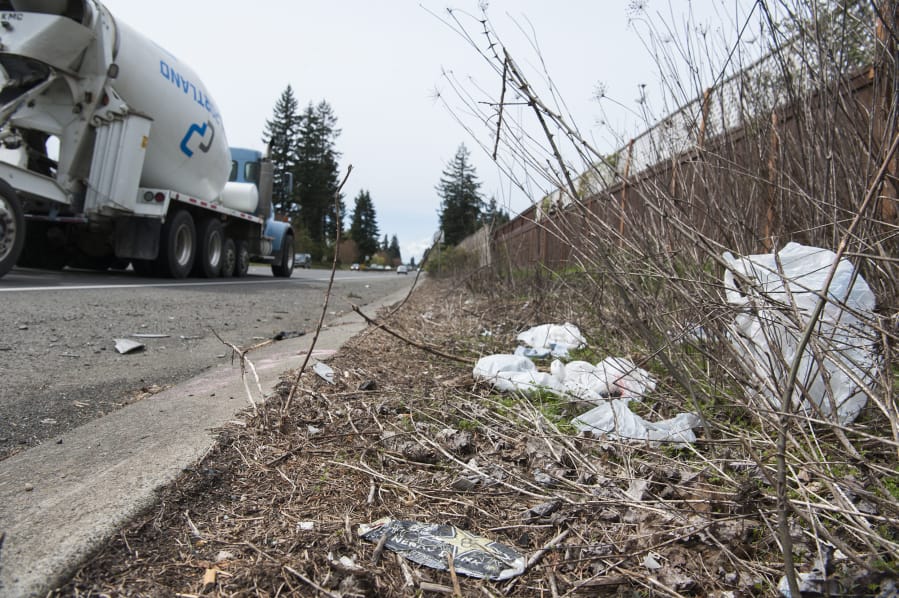It’s that bag that flew out of your truck bed, the cigarette butt you flicked out your window, the mattress you dumped in that empty lot because dump fees are too expensive, the fast-food wrapper you dumped out the window, because, whatever, someone will pick it up.
Litter is an ongoing issue in Clark County, but, in the eyes of at least a few residents, it’s gotten worse and they feel like their pleas to fix it have gone unanswered. Five people recently took advantage of The Columbian’s Clark Asks feature, asking essentially the same questions: Why is there so much trash on the freeways, highways and streets around Vancouver — especially just outside city limits? Why is no one cleaning it up?
“That’s how you want to welcome people to Washington? Well hello, garbage,” said Vancouver resident Tomi Huntley, one of the people who wrote in. “As soon as you hit the ‘Welcome to Washington’ sign (on Interstate 5) it just starts.”
Huntley and the two other readers who responded to The Columbian’s request for comment said trash was scattered around the region, but highways and interstates managed by the Washington Department of Transportation were the worst of all.
They pointed to stretches of Highway 500 / Northeast Padden Parkway near where it becomes Northeast Ward Road, the downtown Vancouver on- and offramps of I-5 as well as those on state Highway 14.
One person complained of trash piling up along the sidewalks in Vancouver’s downtown core and along Kauffman Avenue below Fourth Plain Boulevard.
Ty McConnell said she and her family moved from Portland to Vancouver about three years ago because they were attracted to Vancouver’s comparative cleanliness, relatively smaller homeless problems and safer feel. They live in a subdivision near 152nd Avenue.
“Going down Padden, especially, by Ward Road … that area has a huge amount of garbage,” she said. “There’s been mattresses, boxes, bags galore. It looks really trashy and nobody comes to clean it up.”
She said she’s called and complained about, but no one’s ever cleaned it up.
“It’s just gotten worse to the point, either there needs to be some patrols to clean it or more enforcement of people doing this,” she said.
While the city of Vancouver and Clark County have money dedicated to litter control, WSDOT doesn’t.
“We work off a priority list — safety of the traveling public being No. 1 — and littering is not a safety concern,” said WSDOT maintenance and operations superintendent Bill Morrison. “No one likes to see it, it’s horrible to look at. But when it comes down to our budget, it’s not a safety issue.”
In the Southwest region, which includes Clark County, WSDOT employees are tasked with maintaining about 11,000 lane miles. In such a large work area, safety issues like guardrail repair get priority over picking up trash.
WSDOT primarily counts on Adopt-a-Highway volunteers (which are required to clean a road at least four times per year) and seasonal help from the Washington Department of Ecology’s Ecology Youth Corps to pick it up, not WSDOT employees.
The city, county and WSDOT all have access to and employ inmate crews for work along the roadways. While the city and county have them pick up trash, WSDOT has them trim vegetation that causes visibility issues on the highway.
Picking up garbage in the urban core isn’t a small task because of the dangers associated with working in such a high-speed area. WSDOT doesn’t want to put Adopt-a-Highway groups in that situation. And if they or an inmate crew were to go out there, WSDOT would need to have four employees there to provide traffic-control vehicles for safety. Those four employees would constitute half of WSDOT’s current roadside maintenance crew for the region.
So, if a WSDOT road is clogged with litter, so long as it’s not a safety concern, it’s going to be awhile before it gets picked up.
“I can’t answer how long, a road could go for a year (without litter pickup),” Morrison said. “We’re generally not going to break off a (WSDOT) crew to go pick up litter. We’re going to have an Ecology youth group pick up.”
That’s not to imply WSDOT doesn’t pick up trash. It does when trash poses a safety hazard for the traveling public along the side of the road. It also clears homeless camps, which can be a significant undertaking.
In March, workers picked up more than 27,000 pounds of roadside garbage. The majority of that was gathered and bagged by Ecology Youth Corps and Adopt-a-Highway.
But intentionally or not, people dump so much garbage along the highways that when they are cleared, it doesn’t last long.
“Even with Adopt-a-Highway people, they can make a sweep and even in a week to two weeks it can look like no one touched it. That’s a society and law enforcement issue,” Morrison said.
Scott Wilson, Clark County public works division manager, said they prioritize litter collection, especially on busy roads. His agency is at an advantage over WSDOT because it doesn’t have nearly as large an area to worry about.
“We want to make sure (litter) gets picked up in a quick fashion, otherwise it encourages more dumping,” he said.
Tanya Gray, city of Vancouver solid waste supervisor, said department employees are trying to figure out how they can mitigate and prevent people from dumping their garbage in public places. The city is working with Clark County’s solid waste staff to promote awareness and prevention of littering.
In collaboration with Share House, a homelessness service provider, the city extended a pilot program to employ homeless people to clean up trash in the urban core. The program worked so well last year, they expanded cleanup hours from 15 hours a week to 40.
“We hope to have other community partners provide support to that as well,” she said.




